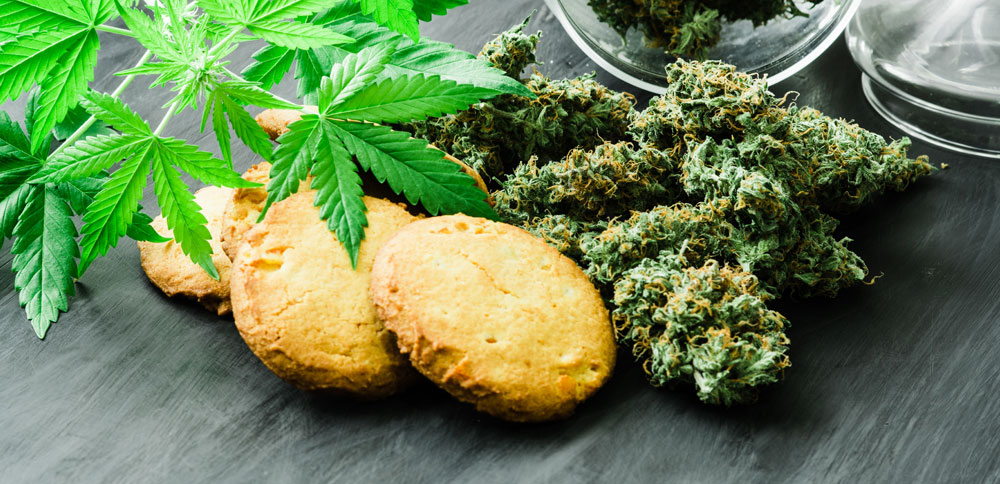
What the Heck is Cannabis-infused Edibles?
Recreational marijuana will officially become legal in Canada on October 17 2018. What does this mean for the Canadian food and beverage industry? Well it’s not as simple as tossing a bit of marijuana into an existing cookie formulation and launching it in the marketplace. Off the top, there are regulatory, industry, crop variety and consumer behaviour considerations. For this Grow with Nutrition blog let’s explore what the heck is Cannabis-infused Edibles?
The Active Ingredients Cannabinoids: CBD and THC
Edibles can range from baked goods to beverages. Most edibles include one or both of the main active cannabinoids: cannabidiol (CBD) and/or tetrahydrocannabinol (THC).
- CDB is the non-psychoactive component of cannabis.
- THC is the psychoactive (i.e., causes the sensation of getting “high”) component of cannabis. It affects our bodies through interacting with our endocannabinoid system. This system includes two cannabinoid receptors: CB1 (found in the areas of the brain responsible for mood, sleep, pain, appetite) and CB2 (found in the immune system and responsible for the anti-inflammatory effects). Ultimately, this activation affects the brain, which is where the positive and negative side effects of cannabis come in. Some negative side effects include: increased heart rate, slow reaction times, poor coordination, and even memory loss.
The Amount
Limited conclusive research is available on the dose response relationship of cannabis-infused edibles due to the obvious pathway of digestion. Depending on the digestive rate of the person, edibles can take 30 minutes to two hours to feel the high sensation, and this sensation will last up to 8 hours. This is a concern for many reasons including working and driving under the prolonged influence.
Microdosing (2 to 5 mg) can be done with both CBD and THC in edibles. This is recommended to establish cannabis tolerance. Note – the physiological pathway to process cannabis is completely different than alcohol, and therefore no similarities can be made to anticipate how someone will handle cannabis-infused edibles.
Research
The proposed health benefits of microdosing THC are to reduce pain, promote sleep, improve mood, increase creativity and may even treat depression. However, these proposed health benefits were not backed up with conclusive scientific evidence. Here are a few research studies, however much more work needs to be done in this area.
Benefits of Microdosing THC in Food
According to a 2017 article published in the journal of Drug and Alcohol Dependence low dose of oral THC could have subjective stress-relieving effects (1). In the study, 42 healthy volunteers agreed to participate in two experimental sessions, which consisted of: a stressful task and a non-stressful task. The participants were randomized to consume a capsule containing one of the following: 7.5 mg oral THC with dextrose filler, 12.5mg of oral THC with dextrose filler, or placebo (only dextrose filler).
The main results showed that the group who consumed 7.5mg THC reduced the duration of negative emotional responses to acute psychosocial stress. In the placebo group, the stress test significantly increased: subjective distress, blood pressure, heart rate, and salivary cortisol. However, compared to placebo and 7.5mg THC, the group who consumed 12.5mg THC showed increased ratings of subjective distress during both experimental sessions.
Benefits of CBD in Food
A Journal of Psychopharmacology article explored oral CBD impact on generalized social anxiety disorder (2). In this very small study, 10 men (mean age=24.2) agreed to consume 400 mg of oral CBD (dissolved in corn oil and formed into a gelatin capsule) or placebo (only corn oil formed into gelatin capsule) in a crossover design. The researchers measured the participants resting regional cerebral blood flow 110 performed a visual analogue time of drug ingestion, 60 minutes after, 75 minutes after, and after SPECT scanning. The results showed that, compared to placebo, there was a significant reduction in subjective anxiety.
In a 2016 study published in the Lancet Neurology oral cannabidiol could have an effect on seizure frequencies (3). In this open-label study, eligible patients (aged 1-30 years of age) with severe epilepsy (also receiving antiepileptic drugs) agreed to receive 2-5mg/kg of oral cannabidiol once a week, and then gradually increased to reach 25+mg/kg per day; the entire observational study lasted for 12 weeks. Mean monthly seizure frequency was calculated at each 4-week visit. Main results showed when analyzing cannabidiol for its safety, 5/162 stopped treatment due to adverse effects. When analyzing the efficacy of cannabidiol, there was a reduction in median monthly frequency of motor seizures, compared to baseline.
Final Thought
Remember we need more research on the many aspects of cannabis-infused edibles. And no single food or ingredient will instantaneously reverse an unhealthy, stressful lifestyle. A way of life filled with healthy habits including a balanced dietary pattern, exercise and restful sleep is the best approach for long-term consistent health.
I’d love to speak at your upcoming conference or event
about latest food and nutrition trends. Click here to contact me.
References:
- Childs E, Lutz J, de Wit H. Dose-related effects of delta-9-THC on emotional responses to acute psychosocial stress. Drug and Alcohol Dependence. 2017; 117:36-144.
- Crippa J, Derenusson G, Ferrari T, Wichert-Ana L, Duran F, Martin-Santos R, Simoes M, Bhattacharyya S, Fusar-Poli P, Atakan Z, Filho A, Freitas-Ferrari M, McGuire P, Zuardi A, Busatto G, Eduardo J, Hallak C. Neural basis of anxiolytic effects of cannabidiol (CBD) in generalized social anxiety disorder: A preliminary report. Journal of Psychopharmacology. 2011; 25(1): 121-130.
- Devinsky O, Marsh E, Friedman D, Thiele E, Laux L, Sullivan J, Miller I, Flamini R, Wilfong A, Filloux F, Wong M, Tilton N, Bruno P, Bluvstein J, Hedlund J, Kamens R, Maclean J, Nangia S, Singhal N, Wilson C, Patel A, Cilio M. Cannabidiol in patients with treatment-resistant epilepsy: An open-label intervention trial. Lancet Neurology. 2016;15: 270-278.
Copyright © 2018 Jane Dummer | All Rights Reserved

